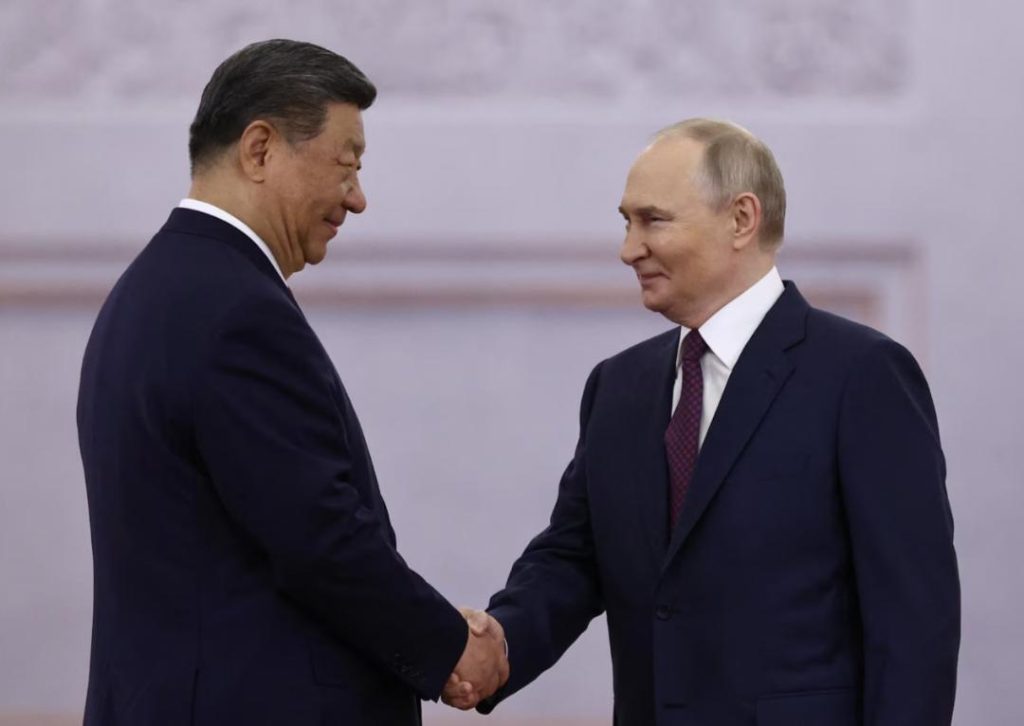
Russia & China Stand United Against Neo-Nazism: Vladimir Putin
On May 8, 2025, Russian President Vladimir Putin and Chinese President Xi Jinping came together to mark 80 years since the “sacred” victory over Adolf Hitler in World War II. This historic occasion was a testament to the unbreakable bond between Russia and China, as they stood united against the growing menace of neo-Nazism.
The ceremony, held at the Kremlin, was a poignant reminder of the immense sacrifices made by countless individuals during the war. Putin, in his address to Xi, expressed his gratitude for China’s participation in the celebrations, acknowledging the significant role it played in the Allied victory.
“The victory over fascism, achieved at the cost of enormous sacrifices, is of lasting significance,” Putin emphasized. “It is a symbol of the unity and solidarity of nations, which allowed us to defeat a monstrous ideology that threatened the very existence of humanity.”
Xi Jinping, in his response, echoed Putin’s sentiments, emphasizing the importance of international cooperation in the face of growing global challenges. “We must continue to work together to promote peace, security, and cooperation, and to defend the principles of sovereignty, justice, and equality,” he said.
The Russian President’s remarks were a clear rebuke to the rise of neo-Nazism in Europe and other parts of the world. In recent years, far-right extremism has gained significant traction, with many countries struggling to contain the spread of hate speech, violence, and discrimination.
Putin’s comments were seen by many as a direct reference to the growing neo-Nazi movement in Ukraine, which has been accused of perpetrating human rights abuses and xenophobia. The Russian government has long been critical of Ukraine’s handling of the issue, and Putin’s remarks were likely aimed at emphasizing the need for international action to combat this menace.
The ceremony at the Kremlin was also seen as a strategic move to strengthen ties between Russia and China, two of the world’s most powerful nations. The two countries have been working closely together on a range of issues, including trade, energy, and security.
In recent years, Russia and China have been expanding their military cooperation, with the two countries conducting joint exercises and exchanging military technology. The Russian-Chinese alliance has been seen as a counterbalance to the growing military presence of the United States and its allies in the Asia-Pacific region.
The ceremony at the Kremlin also served as a reminder of the historical ties between Russia and China. The two countries have a long history of cooperation, dating back to the Soviet era. In the 1950s and 1960s, the Soviet Union and China were close allies, with the Soviet Union providing significant economic and military aid to China during its early years.
However, the relationship between the two countries began to deteriorate in the 1970s, following the Soviet Union’s invasion of Afghanistan and the Chinese government’s decision to normalize relations with the United States. The two countries remained estranged for much of the Cold War era, with China aligning itself with the United States and other Western powers.
However, in the post-Cold War era, Russia and China have been working to rebuild their relationship, with the two countries signing a number of bilateral agreements on trade, energy, and security. The Russian-Chinese alliance has been seen as a key element in the global balance of power, with the two countries working together to promote their shared interests and defend their sovereignty.
In conclusion, the ceremony at the Kremlin was a significant event that marked 80 years since the “sacred” victory over Adolf Hitler in World War II. The Russian President’s remarks were a clear rebuke to the rise of neo-Nazism in Europe and other parts of the world, and emphasized the need for international cooperation to combat this menace.
The event also served as a reminder of the strong ties between Russia and China, two of the world’s most powerful nations. As the global balance of power continues to shift, it is clear that the Russian-Chinese alliance will play a significant role in shaping the course of international relations in the years to come.
Source:
https://www.reuters.com/world/europe/putin-greets-chinas-xi-kremlin-2025-05-08/



